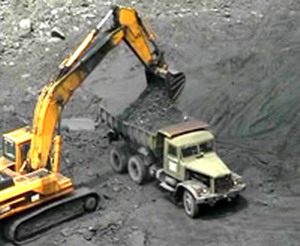INDOCHINA INTERNATIONAL CONSULTING CO., LTD
HO Add: 62L/36 Nguyên Hồng, Ward 11, Bình Thạnh District, HCMC - Vietnam
Biz Office Add: #48 Road No 11, Quarter 6, Hiệp Binh Chánh Ward, Thủ Đức, HCMC - Vietnam
®Source: http://viipip.com should be clearly quoted for any use of information extracted from our website.
Publication permit No: 60/GP-TTĐT , April 05, 2010.

MOF accepts plan for coal price increase
Date: 4/25/2009 11:40:00 AM
The Ministry of Finance (MOF), on November 12, announced that it has accepted the plan for an increase in coal price drawn up by the Vietnam Coal and Mineral Industries Group (Vinacomin).

The prices of coal-dust to be sold to cement, paper and fertilizer producers will be raised to a level that will allow producers to cover production costs. The prices of coal lumps to be sold to phosphate and nitrogenous fertilizer companies will be raised to levels close to the production costs (81% of the production costs). The price increases will be carried out in the first half of November 2008.
In the next period, Vinacomin will be able to sell coal to cement, paper and fertilizer producers at market prices, commencing in the second quarter of 2009.
Only the price of coal to be sold to electricity producers will be temporarily kept unchanged. When the price of electricity is adjusted, the coal price applied to electricity producers will also be adjusted in accordance with the electricity price adjustment itinerary.
According to Nguyen Duc Chi, Chief of the Secretariat of the Ministry of Finance, the coal price adjustment applied to the three big coal consumers (cement, paper and fertilizer producers) should be seen as an important step in regulating coal pricing under the market mechanism.
Chi said that the current coal price adjustment proves to be timely and in accordance with the current regulations on pricing.
In fact, Vinacomin has kept the price of coal stable since January 1, 2008. The coal sale prices applied to the four biggest consumers are lower than the production costs (just equal to 38-79% of the production costs), lower than sale prices applied to household consumption (30-60%), and much lower than the coal export prices.
If Vinacomin does not raise coal prices in 2008, and it only makes the price adjustment once in 2009, consumers will bear sharp price increases in 2009
Currently, as Vinacomin still has to sell coal to domestic consumers at prices lower than the production costs, it has to use the profit it earns from coal exports to offset the loss from selling coal to domestic consumers. Therefore, a low coal price on the domestic market means the exporting of coal is doing well.
Meanwhile, Vietnam is striving to gradually limit coal exports as a strategy to ensure energy security. Vietnam plans to import coal by 2012 to meet the domestic demand.
(Source:VnMedia)
- FDI capital continues to pour into Vietnam (6/11/2025 1:20:33 PM)
- Thanh Hoa receives good news: Preparing to have an additional industrial park of up to 470 hectares, creating jobs for nearly 30,000 people (6/11/2025 1:15:09 PM)
- Industrial Park Real Estate: Waiting for the New Generation of FDI (6/11/2025 1:10:15 PM)
- A wealthy Vietnamese city will have two special economic zones after the merger (6/11/2025 1:04:42 PM)
- 30 billion USD capital FDI in Việt Nam by 2025, a series of "ông big" races to expand the land fund (6/11/2025 12:55:26 PM)
- the 2nd largest city in the North will start construction on an international economic zone (6/11/2025 12:50:20 PM)
- Japanese giant Sumitomo continues to want to build an industrial park in the countrys fourth smallest province. (6/11/2025 12:40:45 PM)
- 3 foreign corporations want to invest billions of dollars in Ba Ria - Vung Tau (6/11/2025 12:34:30 PM)
- Lotte Group member starts construction of nearly 1,000 billion VND logistics center in the province with the most industrial parks in Vietnam (6/11/2025 12:33:26 PM)
- Forming a regional center for manufacturing spare parts and components (6/11/2025 12:24:08 PM)
- Vietnams first wafer factory is about to start construction (6/11/2025 12:19:09 PM)
- Dong Nai attracts foreign investors (6/11/2025 12:13:27 PM)
- Tay Ninhs largest industrial park welcomes a $150 million high-end knitted fabric factory project (6/11/2025 12:11:00 PM)
- (6/11/2025 12:09:10 PM)
- Vietnam will become a destination for Chinese investors in the future (11/6/2023 1:03:19 PM)

- FDI capital continues to pour into Vietnam
- Thanh Hoa receives good news: Preparing to have an additional industrial park of up to 470 hectares, creating jobs for nearly 30,000 people
- Industrial Park Real Estate: Waiting for the New Generation of FDI
- A wealthy Vietnamese city will have two special economic zones after the merger
- 30 billion USD capital FDI in Việt Nam by 2025, a series of "ông big" races to expand the land fund










 ADB: Vietnam’s 2009 GDP growth to be highest in South East Asia
ADB: Vietnam’s 2009 GDP growth to be highest in South East Asia MGM Grand Ho Tram: Vietnam’s First ‘Las Vegas Style’ Integrated Resort
MGM Grand Ho Tram: Vietnam’s First ‘Las Vegas Style’ Integrated Resort Nha Trang’s Twin Towers project licenced
Nha Trang’s Twin Towers project licenced Foreign investors still have good opportunities in Vietnam
Foreign investors still have good opportunities in Vietnam Sierra Wireless gets a foot in Vietnam’s ICT market
Sierra Wireless gets a foot in Vietnam’s ICT market